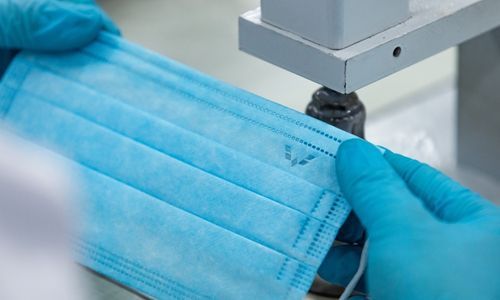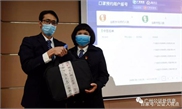SOURCE / INDUSTRIES
Sinopec builds production lines of a core material of face masks

It took just three days for domestic auto brand SGMW to convert its production line from auto to face masks and send out its first shipment amid the nation's fight against the coronavirus. A mask bearing the Wuling logo. Photos: Courtesy of SGMW
Chinese oil giant China Petroleum & Chemical Corporation (Sinopec) will build 10 production lines of melt-blown fabric, which is the basic material to make mask, necessary protection to prevent the spread of COVID-19.
Sinopec will build two production lines in Beijing and eight lines in East China's Jiangsu Province, part of which will be put into operation as early as March 8, the oil enterprise told the Global Times on Tuesday.
Melt-blown fabric is the core material of mask, and its raw material is polypropylene (PP). It is used as the filter layer in the middle of the medical mask.
Sinopec said it vows to take advantage of its rich raw material to help increase the supply of epidemic prevention equipment in view of the shortage of the necessities in China. Demand for face masks has surged significantly since the outbreak of the novel coronavirus.
China produced 53,400 tons of melt-blown fabrics in 2018, according to data of China Nonwovens and Industrial Textiles Association. Each ton of melt-blown fabric can produce 300,000 N95 masks or 1 million medical masks.
According to Sinopec, after the production lines are completed, a total of 12 tons of melt-blown fabric can be produced per day, which can produce 3.6 million N95 masks or 18 million medical masks.
The energy enterprise said it will carry out industrial chain cooperation to form production capacity of masks as soon as possible.
Sinopec has published an article on February 6 titled "I have melt-blown fabric and who has mask machines," going viral online. Later it has agreed to corporate with Naton Medical Group, a mask producer, to help it expand capacity and achieve full capacity production.
Sinopec is not the first enterprise to adjust its production plan. Nearly 4,000 Chinese companies, including makers of cars, diapers and underwear, have added medical supplies to their lines of business in an effort to ease shortages in China during the outbreak of the COVID-19.
A subsidiary of China General Technology Group changed its production plan to produce 20,000 meters of fabrics for protective outfits that can be used to make 10,000 clothing amid the coronavirus outbreak, the company told the Global Times. The firm developed disposable materials for protective outfits during the SARS epidemic in 2003.


